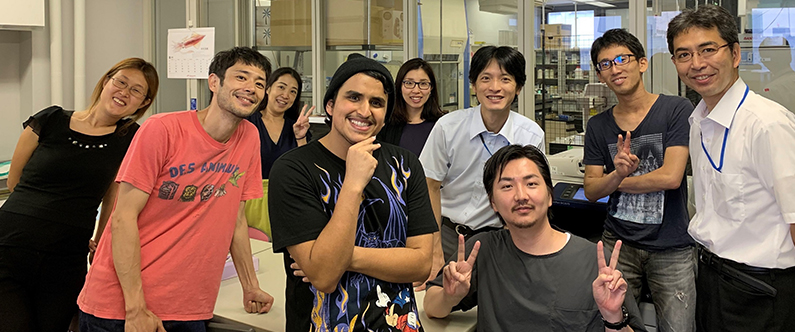WCM-Q students intern in research labs in Boston and Tokyo
 Khalifa Al-Sulaiti at the National Center for Global Health and Medicine in Tokyo.
Khalifa Al-Sulaiti at the National Center for Global Health and Medicine in Tokyo.
Two WCM-Q students experienced research in world-class laboratories after completing summer-long overseas internships.
Nasser Al-Kuwari and Khalifa Al-Sulaiti, who have both recently started their second year of the WCM-Q medical curriculum, applied to MassGeneral Institute for Neurodegenerative diseases (MIND) at Harvard Medical School in Boston and the National Center for Global Health and Medicine in Tokyo respectively. Both were accepted and got to work alongside some of the world’s finest scientific minds.
Nasser, who went to Harvard, worked with Dr. Xiqun Chen in the Department of Neurology at Massachusetts General Hospital (MGH). Prior to going, Nasser wrote that he planned to study potential neuroprotective therapies in genetic models of Parkinson’s disease (PD).
He explained why he chose the subject and the research program. He said: “As a student who is not only interested in neuroscience but also neurology as a possible future specialty, I found the MIND research internship at MGH an opportunity for me to explore both neuroscience and neurology with world-class researchers of Parkinson's disease. Dr. Chen had great contributions to the progress of the understanding of Parkinson’s and developing effective treatments for it, specifically the association of PD with melanoma.”

Nasser was given the opportunity by Dr. Chen to be responsible for a part of the project for eight weeks under the supervision of a postdoctoral researcher, presenting him with a chance to get an insight into the challenges of research, both logistical and experimental.
He said: “The several journal clubs and formal meetings I had with Parkinson’s researches at MGH was a special experience that showed me that nothing is impossible, and I can be in their shoes in the near future.”
Khalifa applied to Dr. Takao Shimizu and Dr. Keisuke Yanagida to work with them on lipid signaling , saying that he hoped to develop a system that would mimic how the brain creates a thin layer of cells called the endothelium, before examining what happens to a certain chemical compound once it is incorporate into the endothelium.
Khalifa said that despite the language barrier, Japan was an attractive overseas research destination because of the high standard of education and the cutting-edge research conducted there. He also felt he would be able to gain valuable work experience.
Khalifa said: “I was able to investigate and use all the advanced research methods that my institution had to offer for mimicking the brain endothelium model. Studying abroad, especially in Japan, is highly valued by employers as the experience develops important skills such as cultural awareness, adaptability, determination, and patience; attributes that are transferable to the workplace.”
Dr. Nayef Mazloum, assistant professor of microbiology & immunology at WCM-Q and assistant dean for student research, agreed and said the experiences are invaluable in giving students with an interest in biomedical research the opportunity to work on real-life studies in world-class laboratories.
He added: “These internships allow students to see how relevant laboratory research is to primary healthcare and teaches them to become independent, critical thinkers and to have to use their own initiative to find mentors and collaborators from across the world.
“It allows them to get outside of Qatar and network with professional scientists and it shows them what it would be like to conduct research full-time as a career.
Nasser and Khalifa were also among several students awarded the Medical Student Research Award (MSRA) 2019. The MSRA is an opportunity offered by the Research Division at WCM-Q to provide funding for first-year medical students to do a total of eight weeks of research in the summer at any location in the world. The program has a tremendous impact on the students, both at an academic level and by increasing their motivation.
The program also encourages the students them to develop important professional qualities as they take up positions in the real world contributing to discoveries in the biomedical field, with responsibilities to their project, their colleagues and their host institution. The MSRA further help mold WCM-Q students as physician-scientists who will enrich Qatar’s healthcare system.